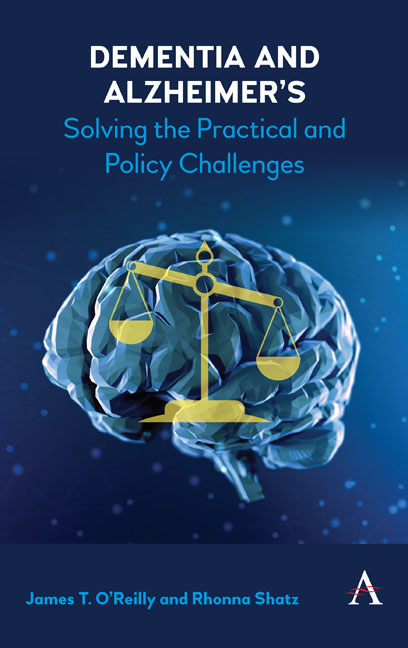Book contents
- Frontmatter
- Contents
- 1 Introduction
- 2 The family dynamics of dementia
- 3 Tort liability related to dementia
- 4 Dementia and private insurance
- 5 Medicare, Medicaid, disability and other government benefits
- 6 Dementia and residential care facilities
- 7 Adult protective services in dementia cases
- 8 Dementia and financial issues
- 9 Dementia in probate and guardianship
- 10 Dementia and employment issues
- 11 Drug research and new product developments for dementia
- 12 Dementia and criminal justice
- 13 Understanding your expert's advice about brain deterioration
- 14 Understanding the causes of Alzheimer's disease
- Appendix: Finding medical reference sources about dementia
- Index
11 - Drug research and new product developments for dementia
- Frontmatter
- Contents
- 1 Introduction
- 2 The family dynamics of dementia
- 3 Tort liability related to dementia
- 4 Dementia and private insurance
- 5 Medicare, Medicaid, disability and other government benefits
- 6 Dementia and residential care facilities
- 7 Adult protective services in dementia cases
- 8 Dementia and financial issues
- 9 Dementia in probate and guardianship
- 10 Dementia and employment issues
- 11 Drug research and new product developments for dementia
- 12 Dementia and criminal justice
- 13 Understanding your expert's advice about brain deterioration
- 14 Understanding the causes of Alzheimer's disease
- Appendix: Finding medical reference sources about dementia
- Index
Summary
Drugs marketed for dementia
Drugs that are intended for treatment of the symptoms of dementia must be taken for months or years, as this cruel disease progressively robs the patient of their independence. Like all drugs for chronic disease, there will be a desired benefit to slow the pace of deterioration. But there will be risks and probably side effects upon the body from drugs aimed to intercept the early symptoms of dementia. Those risks are deemed to be acceptable for individual patients within the scope of medical practice, as individual brains respond differently. Science, law and public policy all recognize the reality of having to perform research on living human brains to develop the next generation of beneficial drugs.
Lawyers are familiar with cases of asserted harm from drugs that did not work as the patient's family had anticipated. In classic drug product liability cases, there will be controversies about how much of the deterioration of this patient was or was not attributable to this drug's adverse side effects. “But for the use of drug A, the brain would not have degenerated at the rate that it has done.” But the causation elements of the tort cases against new medicines are murky, when the progression of dementia symptoms are subtle, and where there is a long time between filing the complaint and achieving a jury verdict. The law of strict liability in tort excludes prescription drugs from claims of “strict” liability without need for a showing of the manufacturer's fault. In the actual experiment, clinical research team requires a written consent, usually with a legal disclaimer of liability, as a precondition to delivering that new experimental drug to that patient. That consent to treatment or experimental use may be a sufficient barrier to having a plaintiff 's lawyer take on the liability lawsuit.
Of course, the legal system for injury claims accepts that it will have many delays. Death of the dementia patient may occur while one awaits a full trial, a jury verdict and an appeal. Meanwhile, that delay is running in parallel to the long slow progression of brain deterioration, and ultimately death, which follows an accurate diagnosis of dementia. Most of these liability cases related to drug research are expected to be dismissed or settled.
- Type
- Chapter
- Information
- Dementia and Alzheimer'sSolving the Practical and Policy Challenges, pp. 75 - 84Publisher: Anthem PressPrint publication year: 2019



